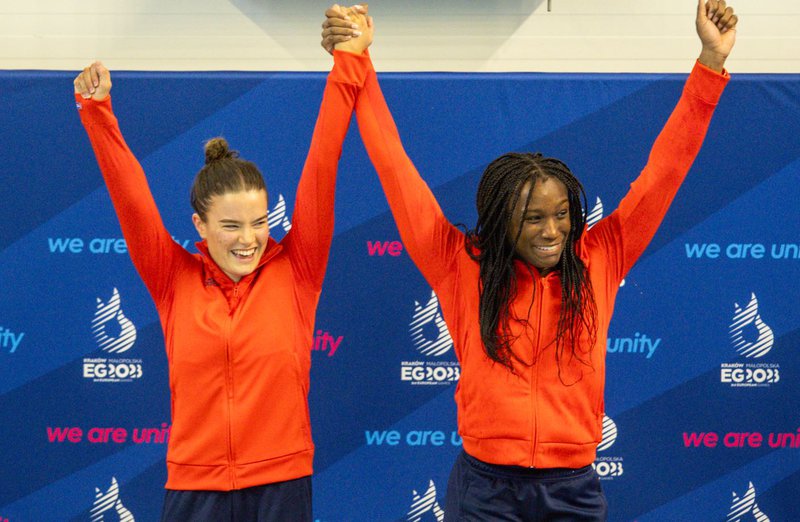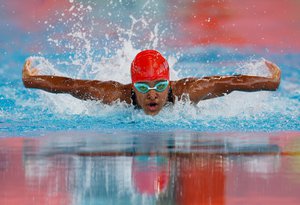It has been a busy year for teenage aquatics trio Skye Carter, Robbie Lee and Desharne Bent-Ashmeil.
Across 2023, Skye, Robbie and Desharne stepped up on to podiums at European Games, European Junior Championships and Youth Commonwealth Games level between them - all eye-catching progress for young athletes who are looking to make their mark on the worlds of swimming and diving over the years to come.
Fifteen-year-old swimmer Skye - who trains at the Basildon and Phoenix Swimming Club - was a medallist at the latter two of those namechecked events, including a Women’s 50m Freestyle bronze at the European Juniors and then a gold – plus a new Championship record – in the same race on the Commonwealth stage.
Diver Desharne, 19, teamed up with synchro partner Amy Rollinson to create an unforgettable moment with Women's 3m Synchro gold for Team GB at the European Games in Krakow, while 18-year-old Robbie clinched a superb maiden senior international medal when he took silver in the Men's 10m Platform event at the European Games, sandwiching that between medal-winning performances at both the World Junior and European Junior Championships.
As part of Black History Month, Skye, Robbie and Desharne sat down to discuss their journeys in sport so far, role models in aquatics and how diversity is changing on poolside...
How do you reflect on this busy year, enjoying the success and managing the competitions?
Robbie Lee [RL]: The last 12 months have been very fun, busy as well, lots of internationals and doing my A Levels at the same time, so that was a challenge to manage!
The diving has been very successful - a silver at European Games which was great, and moving clubs as well, I'm now based in London (after moving from Southampton Diving Academy). It has been very busy but I think I've handled it all right.
Desharne Bent-Ashmeil [DBA]: My year has been quite up and down, I've had a few injuries. From the start of the year, I hurt my ankle, and then just as I'd recovered from that, I hurt my shoulder which stopped me from going to a few competitions.
But coming towards the end of the season, I had a really good run, in my individual, I'm quite proud of myself for that, and then got that gold at European Games in the 3m synchro. It's been eventful but a good experience.
![Robbie-Lee 2 WJDC22 [Credit FINA/Antoine Saito]](https://www.aquaticsgb.com/media/images/Robbe-Lee-Fina.width-300.jpg)
Skye Carter [SC]: I'd say my experiences this year have been really good. I didn't expect to go to as many places and travel the way I did, so the fact I was able to do that was quite surprising and a great experience for me - hopefully I can carry that on next year.
With so many competitions, I'd say that after every one, you just need to take yourself back and stay grounded after each event, that helps to keep you focused.
Let's rewind the clock. How did you first get into your sport - and at what point did you know that it could really go somewhere?
SC: When I was really young, maybe like six months, my dad was already taking me to the pool and helping me to swim and things, so I've never really not swum!
But I only started swimming competitively when I was about 11, when I was doing swimming lessons and they just recommended for me to go to a club. I thought, 'yeah, I might as well try that out', and then I've just kept on going from there really.
Last year when I got selected for EYOF, maybe that's when I was like 'woah!', because I didn't expect to be selected for that team. I haven't had a proper realisation as such that this was going somewhere, it has just kept progressing and it doesn't seem to be slowing down at the moment, which is great.
DBA: So I did gymnastics before I started diving, I did that for about five years, then stopped it when I was nine and took a two-year gap. Then I went with my niece to her gymnastics club at Crystal Palace, and opposite the gym there is the diving area, and I saw someone diving off the 10m - which I don't do, but I saw it! - and I was like, 'wow, I want to try that' because it looked similar to gymnastics.
I didn't know how to swim, so I had to learn how to swim first - that took me six months, and then I came back and just started diving from there.
When I did gymnastics before, I thought I was going to get to the Olympics in that, so I've always really had the dream from the Olympics. As soon as I realised I could do well in this sport, it just clicked.
RL: I haven't got a very fun story, to be honest! I just did some testing at our school and got into the Talent ID programme. A few of us from the same school, we are all still diving and were together in Southampton.
That's how I got into it, by accident really! As soon as I realised you could do flips and stuff, I wanted to take it from there! I was just really energetic when I was younger, always trying to do stupid stuff like that, so as soon as I realised you could do flips and it wasn't just flipping onto your feet, I was hooked.
Desharne, you became the first black diver to win a medal for Team GB at the European Games this summer. How important is it for young people getting into our sports to see a diverse range of athletes competing and succeeding at the highest levels?
DBA: I think it's really important. When I was growing up and I saw diving, the only person I saw at the Olympics diving at a high level was Jennifer Abel.
That really inspired me, not to be a role model for others just yet, but it was like, 'oh, someone else looks like me and they're doing the sport I'm doing'. And now that I am older and higher up in my sport, where I am more noticed than before, I would like to be that same person that other younger generations can look up to and have that same feeling of inclusion that I felt when I watched Jennifer diving.

RL: At the moment, it's quite a white-dominant sport, so seeing people like Jennifer Abel or Yona [Knight-Wisdom] on the 3m is great, to be honest with you. It's nice to see some diversity, and I'm definitely trying to do the same thing and get to the top level and show that diversity, I guess.
Most of the camps and training I've been at, I have been the only person of colour really. It'd be nice if other people didn't really have to experience that - it's not that it's that negative, but you are aware of it. So it would be nice if, moving forwards, there are more black people who get into the sport.
SC: I'd say that since the European Juniors is the future, the next level of swimming, when you look at the current top swimmers and then what is coming through, you can see a lot more diversity at things like European Juniors than you can at the Olympic Games and things.
So the fact that is already showing through, I think it means there will be more diversity in swimming, for sure. Spreading that awareness is very good for the sport as it gets more people to know about it, and just having people in general that younger people can look up to, it's a way of pushing forward and getting more people into the sport and into the pool.
RL: I would just add to Skye's point that the younger generation is way more diverse and inclusive than the older one, really, which is nice to see. So in the next few years and Olympic cycles, I think we'll see a lot more diversity, which is really nice.
What more do you feel could be done to help improve diversity across aquatics?
RL: I'd always got it implied that I wasn't really built for diving or I didn't have the proper build for diving, and I wouldn't really say that's true. I got told my legs were too long, things like that - but I'm not even the tallest diver here.
So I'd say a bit more education would be good, and people saying that there isn't just a one-size-fits-all for diving or swimming either, that lots of different builds of people can be good at the sport, that's what I'd say.
DBA: When advertising sports, maybe making it more inclusive with people of colour [would be a good step]. If I was younger and I was to see it more inclusive on the TV, that would make it more appealing.
Olympic year is nearly upon us. How excited are you for 2024 and everything that brings with it, whether you are targeting Paris or looking to build towards LA in 2028?
SC: I'm really looking forward to Olympic trials when they come around. Even not going to the Olympics in 2024, the fact it's Olympic year, it just gives a bit more buzz to all the competitions that are happening around, so I'm really looking forward to that.

RL: I'm really excited and optimistic. I'm very much a one-step-at-a-time type of person, so it's in the back of my mind and I'm not thinking about it too much because I know there is a lot of work to be done before then. It's fingers crossed and just train as hard as I can.
DBA: I'm very excited too. I've already started my training for it, we've got a few competitions before that so it's just about preparing.
I just feel that, speaking positively, when I make it [to the Games], I will inspire others to want to do things they think they can't do because of the way they look and just make a path and set it.

